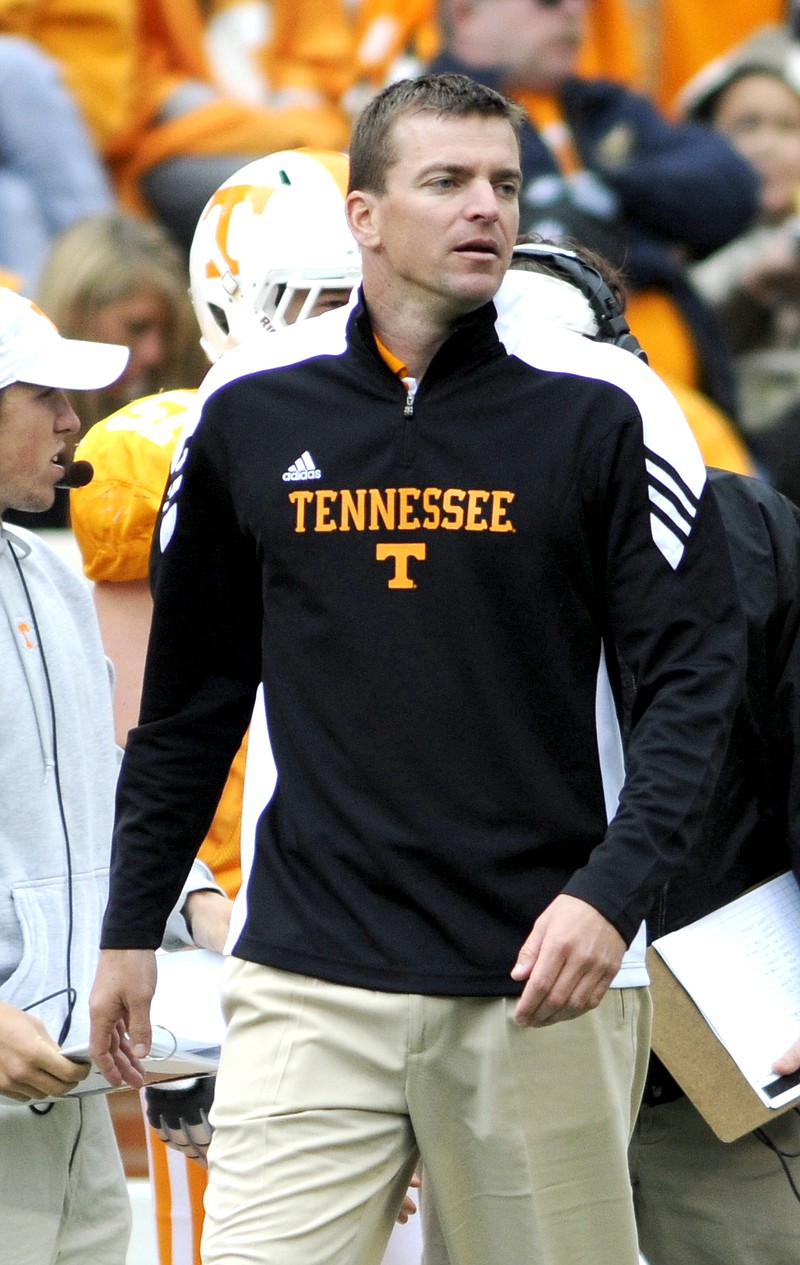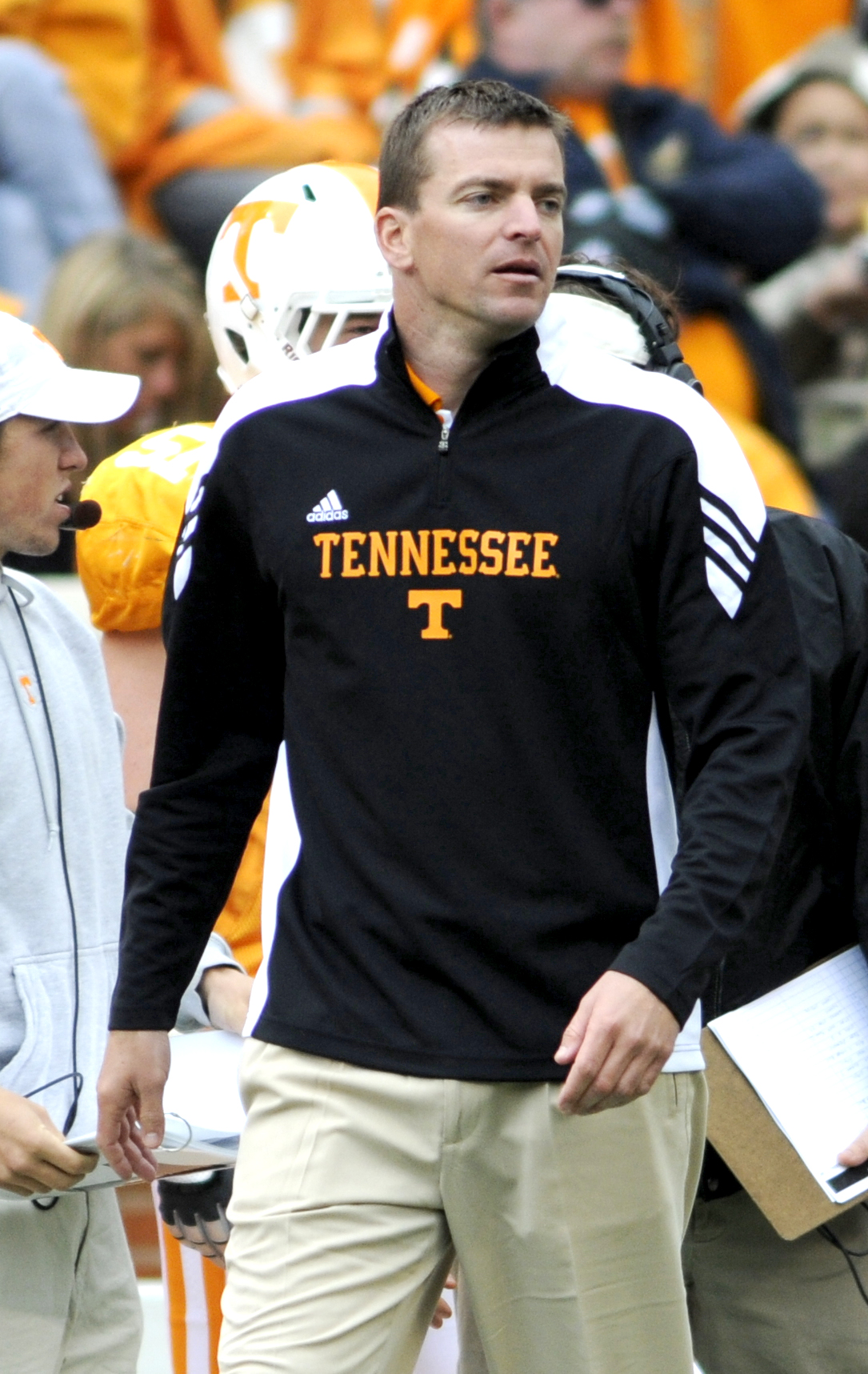KNOXVILLE - Justin Wilcox hardly has time to use a cheat sheet.
Tennessee's defensive coordinator takes a dozen different tests on a dozen autumn Saturdays, and, like any other test or exam, he studies, memorizes and prepares for hours and hours.
In reality, though, Wilcox takes a test each time his Volunteers' defense lines up for a play. And all those hours during the week of breaking down game video, studying opposing offenses and noting their tendencies for any and every possible situation that might come up on Saturday boil down into what he described as a window of six or seven seconds.
"There's a lot that goes into why we're going to call that right now," he said this week as Tennessee prepared for Saturday night's game at second-ranked Alabama.
There are no hunches or guesses, either.
"Everything's educated," Wilcox said. "You have all that information."
There's plenty of it. Wilcox spends all week studying what that week's opponent has done in a variety of previous instances: down, distance, field position, prior tendencies in that particular situation, the personnel on the field and what he calls the "thumbprint" of that offense.
Wilcox and his defensive staff in the press box might have a folder of that information, but during the heat of the moment there's no time to look down at it.
"During the week, all the preparation you've done watching the video, all the breakdowns, that's where that comes in," Wilcox said. "You cannot sit here and and look down and go, 'Well, they're in 11 [a formation with one running and one tight end]. OK, we're going to nickel.' All of the sudden they snap the ball and everybody's like, 'We didn't have a call.' It has to happen fast.'
Wilcox said he second-guesses how he calls a particular play "every time somebody gets a yard." There's no time to do that during the heat of a drive, but when UT's offense is on the field and in reviewing the game, there's even more analysis of when Wilcox might have made the wrong call or when the Vols simply didn't execute it correctly.
"You always go back and look at, OK, here's the situation, here's what they had shown, here's what we called - would I change it?" he said. "Sometimes you're going to say yes, and sometimes you're going to say no. That was the right call based on what they have shown, what we have prepared for, what we think our strengths are.
"Sometimes you're going to be like, 'Yeah, that was stupid, I shouldn't have called that. I should have called this.' I have never, I want to, go through a game and say that was perfect. I've never done it, and I don't know if anybody ever has. Maybe they have, and I'd love to talk to them."
Take an example from early in the second quarter of the Vols' 38-7 loss to LSU last Saturday. Two plays after defensive tackle Daniel Hood sacked LSU quarterback Jordan Jefferson, the Tigers faced a third-and-11 at UT's 13 with a 7-0 lead.
The Vols had a three-man defensive line, and Wilcox called for a blitz - his various angles and looks were his calling card during his time at Boise State before UT coach Derek Dooley hired him last year. Three defenders rushed quarterback Jarrett Lee, who turned left and flipped a swing pass to tailback Spencer Ware, who used two offensive linemen blocking downfield on the screen pass to waltz into the end zone.
If he could do it again, Wilcox might sit back and focus on coverage in trying to hold the Tigers to a field-goal attempt. But that's the risk-reward game within the game he plays with every call.
"There's two strains of thought on coverage," he said. "It's a little bit on their personnel. What's their quarterback like? We do studies. Under five-man pressure, how is he? Six-man pressure, how is he? Max drop, how is he? You look at how their quarterback reacts to certain things.
"Then you say, what are our matchups like? You've got to make your best judgment. [If] it's a great quarterback, you don't want to max drop. He's going to hold the ball longer and he'll pick you apart. Sometimes you've got to take a chance and zero him and get the ball out and make a tackle."
That brings the ultimate variable into the equation of every one of Wilcox's tests. On the exterior of LSU's touchdown, it appears LSU play-caller Greg Studrawa simply beat Wilcox in the chess match on that play. But one UT defender made a mistake, and it cost the Vols.
Wilcox could call a perfect game, but the Vols still have to execute it and either disrupt or create a play.
"Sometimes I've got to make a better call; sometimes we've got execute it better," he said. "I don't know if we could go get the ratio. In terms of the research, we study everything that we do. We're not out there just spinning a wheel.
"It's part of what they do, and it's part of what you think you're good at and what they're good at. That's what it boils down to in terms of calling what you think is best to win that game. It's what's our absolute best chance to play this player, this scheme, that personnel group on that given play."
No time for cheating, either.

